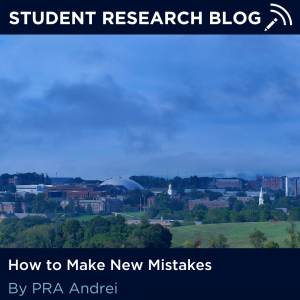By Andrei Abarientos, Peer Research Ambassador
There’s a plethora of articles, classes, and Reddit posts dedicated to ensuring your success in a research career: how to find a professor, how to read papers, and how to make the most of your research experience. Those resources are, of course, incredible and important as you begin your journey into research. On the other hand, there’s a shortage of resources on how to mess up, how to make mistakes and how to handle them. In my opinion, knowing how to deal with your own human fumbles can be an even more important skill to be an effective scientist or researcher. Properly reacting to mistakes is key for building endurance in research, where blunders are commonplace in the field.
With that in mind, I think of myself as a bit of an expert on mistake-making. To be clear, I consider myself fairly adept in the lab, and I’m proud of the work I’ve accomplished. At the same time, over the course of my research career, I’ve mixed up samples, pipetted incorrect amounts, and lost track of what step I was on during a long experiment (most wet lab folks probably know the mental struggle of pipetting clear liquids into more clear liquids without getting confused). I’ve spent hours on assays like a western blot only to see it fail for one reason or another (see SDS-PAGE “Hall of Shame” for a sense of what I’m talking about).
I take solace knowing I’m not alone in this, having witnessed everyone from other undergrads to tenure-track professors make simple mistakes The title of this article’s a bit misleading. There’s no need to discuss how to make a mistake; if you haven’t made a mistake yet, you just have to spend some more time doing research. When you do the work for long enough, it’s bound to happen. It isn’t really science without some degree of failure, is it?
But especially when you’re just getting started, I know that those small mistakes can feel terrifying. You want to come off as the perfect undergraduate star, and you want to prove your worth, both to your research group and to yourself. It feels like any error threatens that perception. Here’s a few tips on how to make the most of your mistakes:
- Breathe. Like I said before, everyone makes mistakes. No matter what career you enter, they’re bound to happen, and research especially is full of them. Don’t brush errors aside, but don’t take them incredibly personally either. Your suitability for research isn’t defined by minute moments, but instead by big picture progress. Little errors say little about your aptitude, but your reaction can.
- Own up to them. I know, especially with an academic mindset where mistakes are often affiliated with penalties and grade deductions, your first instinct may be to try to cover up your own errors. I’ve heard stories of undergraduates trying their best to move forward with an experiment knowing they messed up, wasting their time and possibly their mentor’s time. Especially if you’re working closely with a mentor on a project, or using someone else’s samples, it’s crucial that you let them know immediately so you can move forward effectively. If you’re in a positive research environment, you shouldn’t expect any sort of long-term detriment to simple, one-off mistakes. As always, communication is key.
- Think about ways to prevent them in the future. Sometimes, things just happen: a distracting noise, a pipette going awry. Most of the time, though, there’s some sort of way you can mediate potential issues in the future. Sometimes, you just need to be more mindful of the work you’re doing. Especially if it’s a protocol you’ve done many times before, it can be easy to go on autopilot and make a simple foible. Simply forcing yourself to be present, and keeping past errors in mind, can be enough. Other times, you can consider making the work easier to remember for yourself, including integrating a checklist or putting away reagents as soon as you’re done working with them.
You are not defined by your mistakes but instead by your reaction to them, and how you carry yourself forward in the future. Mistakes are a part of the learning process. No matter what level of research you are on, you will inevitably mess up sometimes. The most memorable and important advice I’ve received since I began my research journey was three simple words: “Make new mistakes”. View your mistakes as a chance to learn something new and better your own skills. If you keep your head up and stay on a path of learning, you should be able to avoid making the same mistake twice.